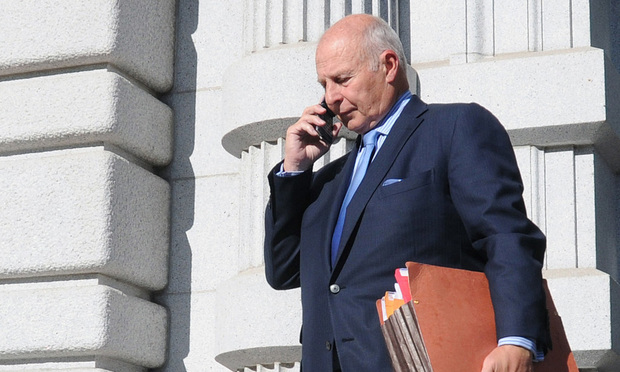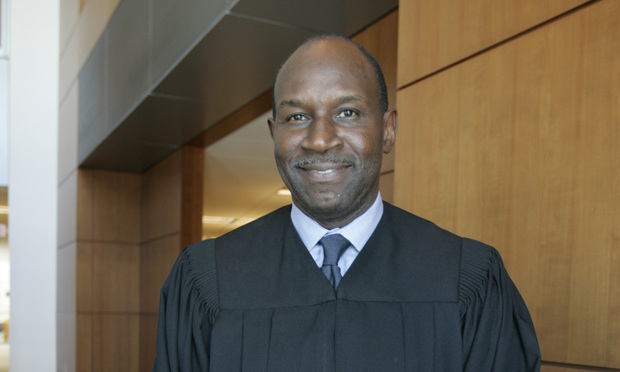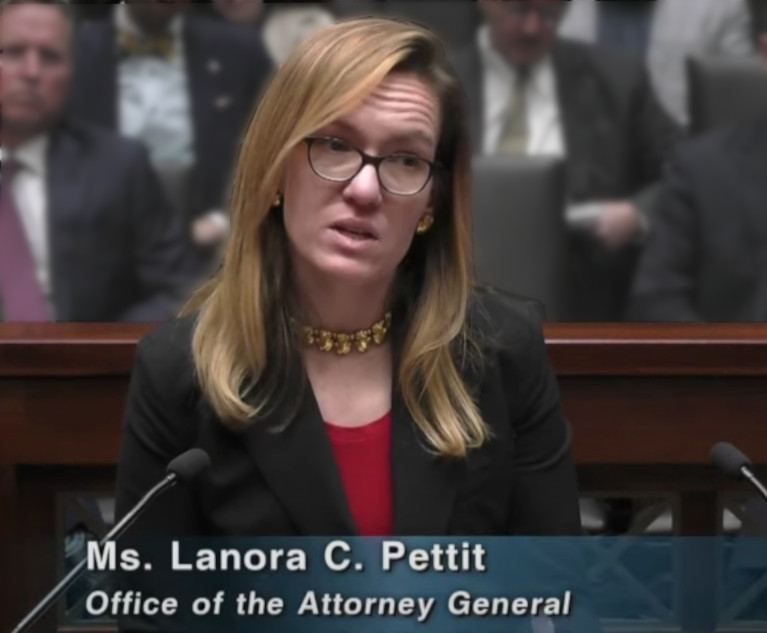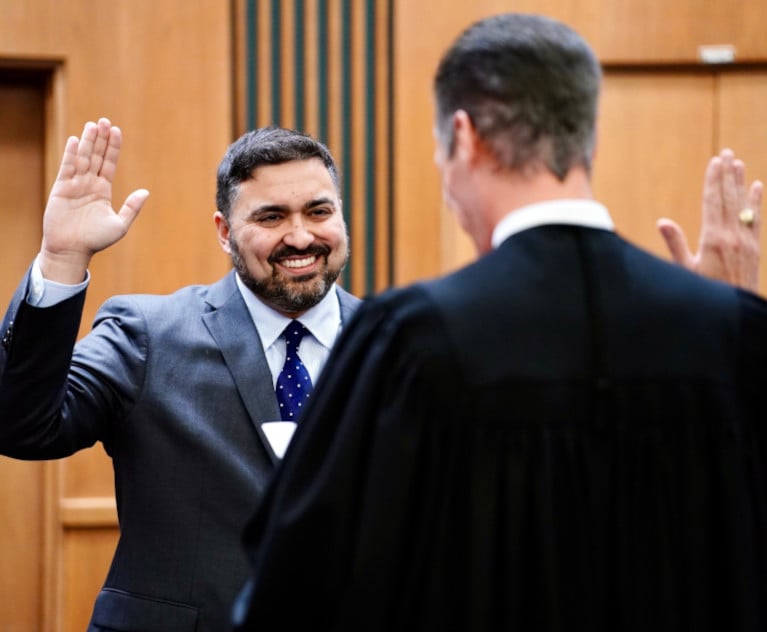Tom Girardi Among Lawyers Who Will Vet California Judges
More than 100 trial court judges, state appellate justices, county prosecutors, litigators and former state bar leaders will serve on eight regional committees.
June 26, 2019 at 01:11 PM
4 minute read
 Thomas Girardi. Photo: Christine Jegan
Thomas Girardi. Photo: Christine Jegan
California Gov. Gavin Newsom has chosen more than 100 judges, plaintiffs lawyers, Big Law partners and in-house attorneys from around the state to guide him on filling judicial vacancies, his office said Wednesday.
The 111 trial court judges, state appellate justices, county prosecutors, litigators and former state bar leaders will serve on eight regional committees charged with providing the governor and Judicial Appointments Secretary Martin Jenkins with “preliminary, non-partisan feedback” on applicants for the bench.
Several plaintiffs lawyers were picked for advisers, and among them is Thomas Girardi, the prominent Beverly Hills lawyer who was recently hit with suits in Los Angeles and Arizona over allegedly failing to make certain loan payments.
Also chosen was Paul Grewal, deputy general counsel at Facebook and a former U.S. magistrate judge in California's Northern District, who will vet candidates from the San Francisco Bay Area. Joining Grewal on the Bay Area committee is Lindbergh Porter, chair of Littler Mendelson's board of directors.
Former state Supreme Court Justice Carlos Moreno will serve on the Los Angeles County committee alongside Girardi, who was not immediately reached for comment. The Los Angeles committee also includes Roman Silberfeld of Robins Kaplan and eight Los Angeles Superior Court judges.
Joining Grewal on the Bay Area committee is Lindbergh Porter, chair of Littler Mendelson's board of directors, and Quyen Ta, a Boies Schiller Flexner partner who focuses on class action defense.
Jinnifer Pitcher, a senior associate at Orrick, Herrington & Sutcliffe in Sacramento, will serve on the Northern California committee. Cooley partner Michael Attanasio, chair of the firm's global litigation team, will serve as an adviser on the San Diego committee.
The regional advisers as described by Newsom's office will make up a more formal vetting structure than the one used by Gov. Jerry Brown, who relied on an inner circle of advisers and his own quizzing of some judicial candidates.
Former Gov. Arnold Schwarzenegger employed a system—similar to the one outlined by Newsom—of regional screening committees. But there was one significant difference: Schwarzenegger refused to identify his private advisers, a practice that so angered some legislative Democrats that they introduced ultimately unsuccessful legislation to unmask them.
“The people of our state have little insight on the process by which judges are chosen,” Newsom said in a prepared statement. “It is only fair that the public knows who is helping to select the people who will serve them.”
 1st District Court of Appeals Justice Martin Jenkins. Credit: Jason Doiy / ALM
1st District Court of Appeals Justice Martin Jenkins. Credit: Jason Doiy / ALMJenkins chose the 111 advisers based on their good standing with the bar and their diversity with respect to race, ethnicity, gender, sexual orientation and practice area, according to the governor's office.
Three former presidents of the California State Bar were named: Holly Fujie, now a Los Angeles County Superior Court judge; Luis Rodriguez, division chief of the Los Angeles County Public Defender's Office; and Michael Colantuono, a municipal law specialist with Colantuono, Highsmith & Whatley in Grass Valley.
Jenkins also chose from the ranks of the biggest plaintiffs firms in the state. Five advisers are consumer attorneys who donated, or whose firms donated, more than $253,000 combined to Newsom's gubernatorial campaign.
The regional advisory committees will meet at the request of Jenkins and “provide feedback on candidates' legal acumen, work ethic, temperament and demonstrated commitment to public service” before their names are forwarded to Newsom, the governor's office said.
Attorneys interested in becoming a judge should not contact the advisers directly, according to the governor's office, but should instead start the application process on the administration's website.
The full list of regional advisers is posted below:
This content has been archived. It is available through our partners, LexisNexis® and Bloomberg Law.
To view this content, please continue to their sites.
Not a Lexis Subscriber?
Subscribe Now
Not a Bloomberg Law Subscriber?
Subscribe Now
NOT FOR REPRINT
© 2025 ALM Global, LLC, All Rights Reserved. Request academic re-use from www.copyright.com. All other uses, submit a request to [email protected]. For more information visit Asset & Logo Licensing.
You Might Like
View All


Trending Stories
- 1An Eye on ‘De-Risking’: Chewing on Hot Topics in Litigation Funding With Jeffery Lula of GLS Capital
- 2Arguing Class Actions: With Friends Like These...
- 3How Some Elite Law Firms Are Growing Equity Partner Ranks Faster Than Others
- 4Fried Frank Partner Leaves for Paul Hastings to Start Tech Transactions Practice
- 5Stradley Ronon Welcomes Insurance Team From Mintz
Who Got The Work
J. Brugh Lower of Gibbons has entered an appearance for industrial equipment supplier Devco Corporation in a pending trademark infringement lawsuit. The suit, accusing the defendant of selling knock-off Graco products, was filed Dec. 18 in New Jersey District Court by Rivkin Radler on behalf of Graco Inc. and Graco Minnesota. The case, assigned to U.S. District Judge Zahid N. Quraishi, is 3:24-cv-11294, Graco Inc. et al v. Devco Corporation.
Who Got The Work
Rebecca Maller-Stein and Kent A. Yalowitz of Arnold & Porter Kaye Scholer have entered their appearances for Hanaco Venture Capital and its executives, Lior Prosor and David Frankel, in a pending securities lawsuit. The action, filed on Dec. 24 in New York Southern District Court by Zell, Aron & Co. on behalf of Goldeneye Advisors, accuses the defendants of negligently and fraudulently managing the plaintiff's $1 million investment. The case, assigned to U.S. District Judge Vernon S. Broderick, is 1:24-cv-09918, Goldeneye Advisors, LLC v. Hanaco Venture Capital, Ltd. et al.
Who Got The Work
Attorneys from A&O Shearman has stepped in as defense counsel for Toronto-Dominion Bank and other defendants in a pending securities class action. The suit, filed Dec. 11 in New York Southern District Court by Bleichmar Fonti & Auld, accuses the defendants of concealing the bank's 'pervasive' deficiencies in regards to its compliance with the Bank Secrecy Act and the quality of its anti-money laundering controls. The case, assigned to U.S. District Judge Arun Subramanian, is 1:24-cv-09445, Gonzalez v. The Toronto-Dominion Bank et al.
Who Got The Work
Crown Castle International, a Pennsylvania company providing shared communications infrastructure, has turned to Luke D. Wolf of Gordon Rees Scully Mansukhani to fend off a pending breach-of-contract lawsuit. The court action, filed Nov. 25 in Michigan Eastern District Court by Hooper Hathaway PC on behalf of The Town Residences LLC, accuses Crown Castle of failing to transfer approximately $30,000 in utility payments from T-Mobile in breach of a roof-top lease and assignment agreement. The case, assigned to U.S. District Judge Susan K. Declercq, is 2:24-cv-13131, The Town Residences LLC v. T-Mobile US, Inc. et al.
Who Got The Work
Wilfred P. Coronato and Daniel M. Schwartz of McCarter & English have stepped in as defense counsel to Electrolux Home Products Inc. in a pending product liability lawsuit. The court action, filed Nov. 26 in New York Eastern District Court by Poulos Lopiccolo PC and Nagel Rice LLP on behalf of David Stern, alleges that the defendant's refrigerators’ drawers and shelving repeatedly break and fall apart within months after purchase. The case, assigned to U.S. District Judge Joan M. Azrack, is 2:24-cv-08204, Stern v. Electrolux Home Products, Inc.
Featured Firms
Law Offices of Gary Martin Hays & Associates, P.C.
(470) 294-1674
Law Offices of Mark E. Salomone
(857) 444-6468
Smith & Hassler
(713) 739-1250









